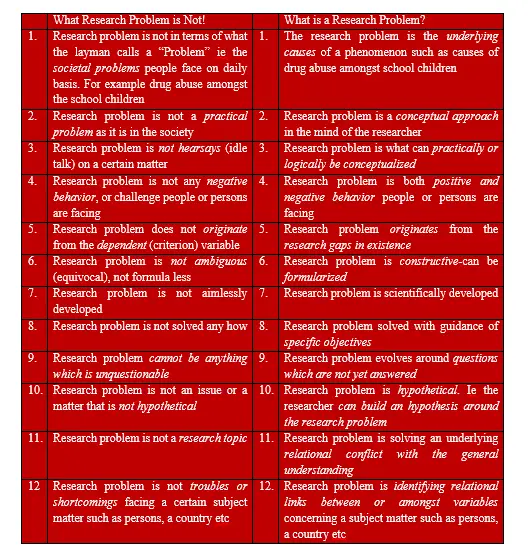Research problem:Definition and characteristics
1.1Definition:
What is a research problem? And what is not a research problem? Let us first define what this term means in the world of Research and because many students especially at Masters level and even sometimes the doctorate cadre confuse the term, I will then clarify to you what “research problem is not”
Research Problem is the question that the researcher has in his/her mind that require an answer through SCIENTIFIC investigation or inquiry. It is that unanswered question the researcher is curious to define using intellectual approach. Therefore, it is an aspect of concern that needs a meaningful understanding of a specific focus. It can either be a situation, an ambiguity, conflict or a difficulty circumstance. So in a nutshell, research problem entails provision of solutions to queries strengthening prevailing body of knowledge to bridge the research gap (ie knowledge gap) which have been in existence.
Apparently, the term “research problem” seem to scholars and researchers like you and others that it is a real problem or a social problem that the society, government, families or religious fraternities have faced in real life set ups. This is not true. For example, today the youth, are more engaged in drug abuse unlike ancient times. This is a social problem. A real menace and the parents are seriously worried of their children’s future. Look at the rate of divorce in the Christian and other religious circles, single mothers and single fathers have dominated the religious circles. This may not be a problem to you but to many, it is. These and other similar societal cases are all practical problems.
So the question is, is societal problems (ie practical) the same as research problem? The answer is a capital “NO!” Then, where is the difference? Before I provide you with a permanent solution, let me give you some hint about a research problem.
From the aforementioned definition, research problem is that unanswered question that the researcher will use a scientific investigative approach to provide a solution. The term SCIENCE is the game changer as far as what researchers and scholars term as a research problem and what research problem is not.
From the viewpoint of scientists, “Science” can be defined in threefold ways as;
- The logical and theoretical activity incorporating the systematic study of the structure and behavior of the physical and natural world through observation and experiment (Oxford English Dictionary).
- The systematic study of the nature and behavior of the material and physical universe, based on observation, experiment, and measurement, and the formulation of laws to describe these facts in general terms (Collins English Dictionary).
- Knowledge from careful study of the structure and behavior of the physical world, especially by watching, measuring, and doing experiments, and the development of theories to describe the results of these activities (Cambridge Dictionary).
From these three selected definition of the term Science, it is crystal clear that for a research problem to qualify as one, it must meet the following THREE scientific attributes;
i) Should concern the working of structure and behavior (whether good or bad) of physical and natural phenomenon.
ii) Scientific methodology must be used to arrive at results such as observation, experiment, measurement and development of theories to back the answers gotten
iii)Logic must prevail when relating factors or variables under consideration
In a short conclusion, research problem should be viewed from the lenses of why variables relate with one another in the natural phenomenon and the working here may not necessarily mean good or bad correlating. It can be either. So the common practice with some researchers and scholars of focusing on bad scenarios as the study problem is not right. A research problem is not societal but conceptual, not individualistic but idealistic.
1.2 Difference between Research Problem and What Research Problem is Not
Now we can have a look at the distinguishing differences between societal or practical problems that the society face in their locality and what ought to be “research problem” from the researcher’s point of view as indicated in Table 1.1
Table 1.1: Difference between Research Problem and What Research Problem is “Not”

1.3 Characteristics of Research Problem
In the previous sub-title on what research problem is and what research problem is not, we can culminate this matter by walking through mainstream attributes that describe a research problem. Those attributes include and not limited to;
- Based on Research gaps in a certain field of study
- It has Clarity of the research problem.
- It trickles down to research specific objectives
- It trickles down to Specific Research Question Format
- It trickles down to hypotheses
- It is possible to establish a statement of the research problem
- It is based on theoretical foundations.
- It is anchored on a certain domain of study (ies) of academia.
- There exists underlying empirical literature
- It carries a socio-economic value to the end users
- It is attainable in terms of time scope and financial resources availability.
- Ambulant data is available to facilitate research
- There exists applicable research methodology to accomplish the research problem or assignment at hand.
- It has corresponding research findings